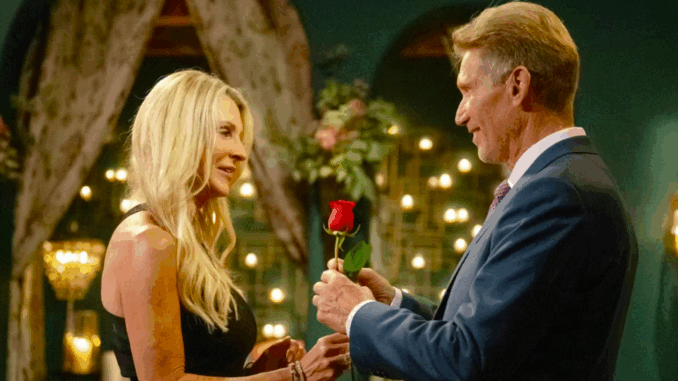
When The Golden Bachelor premiered on ABC, there was skepticism. Could a dating show about people in their golden years be as captivating as the drama-fueled antics of its younger predecessors? But by the time Gerry Turner stood beneath that iconic rose arch, hands trembling, eyes filled with hope and history, America was already in love — not just with him, but with the idea that love has no expiration date.
A New Kind of Leading Man
At 72, Gerry Turner broke the mold of what it meant to be “The Bachelor.” A widower, retired restaurateur, father, and grandfather, Gerry’s appeal wasn’t in his abs or Instagram presence. It was in his vulnerability. His voice cracked when he spoke of his late wife. His eyes lit up when women shared stories of second chances. He didn’t posture. He didn’t play games. He listened.
What made Gerry special wasn’t that he was older — it was that he carried history. He had already lived a full love story, complete with decades of devotion, loss, and grief. And yet, he still believed in the possibility of beginning again. That alone made his journey not just relatable, but revolutionary.
A Landscape of Late-Life Love
The Golden Bachelor didn’t just present a twist on a franchise. It quietly redefined societal norms. Aging, in television especially, is too often framed as decline — the end of desire, of transformation, of purpose. But the show flipped that idea on its head.
Here were women in their 60s and 70s dancing in high heels, opening up about sex, heartbreak, careers, and reinvention. Here was a man their age — a peer — actively choosing connection over isolation. The audience, many of whom are used to being erased from popular narratives, finally saw themselves not as side characters, but as romantic leads.
For a generation long told that youth is a prerequisite for passion, this was a quiet act of rebellion — and a deeply moving one.
The Gentle Power of Vulnerability
Much of The Golden Bachelor’s emotional strength came from Gerry’s willingness to be vulnerable. His dates weren’t just flirtatious strolls — they were conversations about death, divorce, regret, and resilience. He cried often. He comforted women who hadn’t felt desired in decades. He struggled with decisions, not because he didn’t care, but because he cared too much.
In a media landscape where men are often rewarded for emotional detachment, Gerry’s softness was a breath of fresh air. It reminded viewers — especially older men — that strength and sensitivity aren’t opposites.
He wasn’t a perfect hero. He hesitated, he second-guessed, and in the finale, his decision caused controversy. But in doing so, he embodied something rarely seen on reality TV: emotional complexity rooted in real-world stakes.
A Cultural Ripple Effect
The cultural impact of The Golden Bachelor cannot be overstated. Viewership numbers soared not just from loyal franchise fans, but from new audiences who finally felt seen. Social media lit up with older viewers posting selfies in rose-themed pajamas, grandparents hosting watch parties, and grown children expressing surprise at how into it they had become.
Suddenly, late-in-life dating was no longer a punchline — it was aspirational.
More importantly, conversations around aging shifted. People began talking about their widowed parents reentering the dating world, about their own fears of starting over after 50 or 60. For many, The Golden Bachelor offered not just entertainment, but emotional permission: You are never too old to fall in love again.
The Price of Second Chances
Still, Gerry’s journey wasn’t without cost. As the season wore on, the weight of his decisions grew heavier. He developed real connections with multiple women — and when the final rose was handed to Theresa, the heartbreak of others, particularly Leslie, was palpable.
Some viewers criticized him for leading Leslie on. Others defended him, pointing out the impossibility of avoiding hurt in such an emotionally charged environment. Regardless, what the show demonstrated — for better or worse — is that second chances often come tangled in complications.
Falling in love at 72 doesn’t eliminate the pain of choosing, or the risk of getting it wrong. It just proves that love, at any age, is messy, unpredictable, and worth it.
Where Gerry Goes From Here
As of early 2025, Gerry’s post-show journey continues to unfold. His relationship with Theresa sparked headlines — both celebratory and skeptical. But whether the romance lasts or not, Gerry has already reshaped what many believed possible.
He didn’t just go on a reality show. He opened a door.
He showed us that men can grieve and still hope, that women can age and still be desired, that life can deliver plot twists long after the credits are expected to roll.
And in doing so, Gerry Turner gave a generation something far more powerful than entertainment. He gave them belief.
